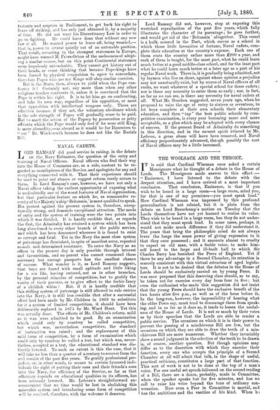NAVAL CADETS,
LORD RAMSAY did good service in raising, in the debate on the Navy Estimates, the question of the entry and training of Naval Officers. Naval officers who find their way
into the House of Commons are, as a rule, content to be re- garded as mouthpieces of the Service, and apologists for any and everything connected with it. That their experience should be used to point out abuses or suggest reform rarely occurs to them. In Lord Ramsay's case, however, we have not only a Naval officer taking the earliest opportunity of exposing what
is undoubtedly one of the worst features of Naval organisation, hut that particular feature on which he, as commander re- tly of her Majesty's ship 'Britannia,' is most qualified to speak. His protest against the present system is, therefore, excep- tionally strong, and demands exceptional attention. The mode of entry and the system of training were the two points into which it was divided. It is hardly credible that, as regards the first, the Admiralty has retained a system which has been long abandoned in every other branch of the public service, and which has been denounced wherever it is found to exist as corrupt and fatal. Yet in the Navy the most close system of patronage has flourished, in spite of manifest error, repeated assault, and determined resistance. To enter the Navy as an officer in the present day is only possible through interest and favouritism, and no parent who cannot command these necessary but corrupt passports has the smallest chance of success. What wonder is it, as Lord Ramsay suggests, that boys are found with small aptitude and little liking for a sea life, having entered, not as in other branches, by the personal stimulus of competition, but to gratify the vanity of their parents, or to give effect to the feeble fancy of a childish whim ? But, if it is hardly credible that this stifling system of patronage is still allowed to rule entries into the Navy, it is still less credible that after a successful effort had been made by Mr. Childers in 1869 to substitute for it a system of limited competition, it should have been deliberately replaced in 1875 by Mr. Ward Hunt. Yet this was actually done. The effects of Mr. Childers's reform, mild as it was, were admitted to be good. By an examination which could only by courtesy be called competitive, but which was, nevertheless, competitive, the standard of instruction was raised ; and the replacement of this mild form of competition, by a form of examination which could only by courtesy be called a test, but which was, never- theless, accepted as a test, the educational standard was dis- tinctly lowered. To such an extent is this the case, that it will take no less than a quarter of a century to recover from the evil results of the past five years. To gratify professional pre- judice, or, in other words, to secure to certain favoured indi- viduals the right of putting their sons and their friends's sons into the Navy, the efficiency of the Service, so far as that efficiency depends on educational qualities in its officers, has been seriously lowered. Mr. Lefevre's straightforward an- nouncement that no time would be lost in abolishing this miserable system and introducing some form of competition will be received, therefore, with the welcome it deserves.
Lord Ramsay did not, however, stop at exposing this wretched reproduction of the past five years, which fully illustrates the character of its parentage ; he goes further, and would get rid of the 'Britannia' altogether. This vessel is a hulk, moored in the Dart, which serves as a school in which those little favourites of fortune, Naval cadets, com- plete their education at the country's expense. Each one of them costs the country rather more than £200 a year, and each of them is taught, for the most part, what he could learn much Fetter at a good middle-class school, and for the least part what he could learn much better at a later age as a part of his regular Naval work. There is, it is gradually being admitted, not by laymen who live on shore, against whose opinion a prejudice may not unnaturally exist, but by scores of Naval officers of all ranks, no want whatever of a special school for these cadets ; nor is there any necessity to enter them so early ; nor, in fact, so far as we can see, is there any necessity for naval cadets at all. What Mr. Goschen suggested, seven years ago, when he proposed to raise the age of entry to sixteen or seventeen, to let boys complete at their own schools their elementary education, and then " tap " the best public schools by com- petitive examination, is every year becoming more and more acceptable, as a plan which may be adopted with every chance of success. lithe present Board of Admiralty do something in this direction, and in the earnest spirit evinced by Mr. Lefevre, a gross abuse will have been removed, and Naval efficiency proportionately advanced, though possibly the cost of Naval officers may be a little increased.


































 Previous page
Previous page